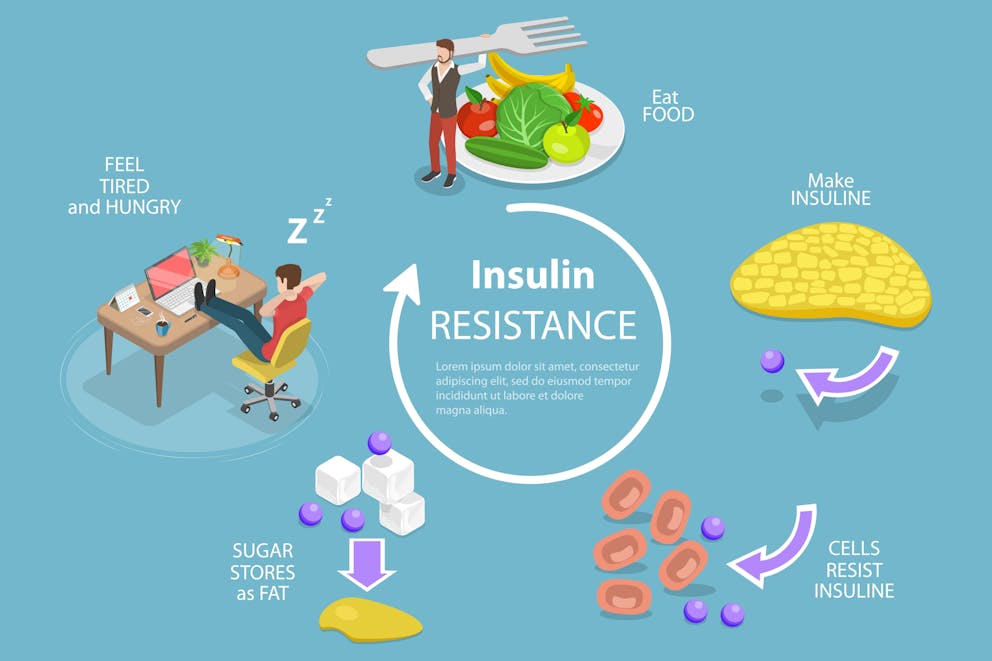What Is Excess Carbs
Have you ever wondered why your energy crashes after a carb-heavy meal? Or why controlling blood sugar seems like an uphill battle? Well, understanding excessive carbs and blood sugar levels might just hold the key.
It's fascinating yet alarming—while we need some carbohydrates for fuel, going overboard can wreak havoc on our bodies.
Excessive carbs are more common than you'd think. From white bread to sugary snacks, they're everywhere! And guess what? They don't just mess with your waistline; they spike your blood sugar too.
Let's explore how those sneaky sugars impact your health—and discover ways to keep things in check.
Understanding Excessive Carbs and Blood Sugar Levels
When it comes to understanding excessive carbs and their impact on blood sugar levels, it's important to know what constitutes a normal range.
Normal blood sugars typically fall between 80 to 90 milligrams per deciliter, which equates to about one teaspoon of sugar circulating in the entire body.
So, what exactly are excessive carbs? Consuming anything more than the equivalent of one teaspoon of sugar can be considered excessive. Shockingly, the average person consumes a whopping 27 to 31 teaspoons of sugar daily, far exceeding the recommended levels.
What Are Excessive Carbs?
Excessive carbs refer to consuming more than the body needs for normal functioning.
The American Diabetes Association recommends that 60% of the diet should be in the form of carbohydrates, but this doesn't give you free rein to load up on sugary treats and refined carbs.
It's crucial to understand the threshold for excessive carbohydrate intake based on normal blood sugar levels. When you consume too many carbs, especially simple sugars and refined carbohydrates, your blood sugar levels can spike rapidly, leading to a host of health issues.
Average Sugar Consumption
The average person's sugar consumption is staggering compared to recommended levels. While normal blood sugar levels indicate having just one teaspoon of sugar in the entire body, most people consume 27 to 31 times that amount daily.
Impact of Excessive Carbs on Blood Sugar Levels
Consuming excessive carbohydrates can have a significant impact on your blood sugar levels and overall health. When you eat carbs, your body breaks them down into glucose, which enters the bloodstream and causes blood sugar levels to rise.
Blood Sugar Spikes
High carbohydrate intake, particularly from simple sugars and refined carbs, can lead to rapid increases in blood sugar levels. These blood sugar spikes can cause a host of symptoms, including energy crashes, mood swings, and cravings for more sugary foods.
Over time, frequent blood sugar spikes can put a strain on your body's ability to regulate glucose levels effectively, increasing your risk of developing insulin resistance and type 2 diabetes.

Insulin Resistance
When you consistently consume excessive carbs, your body may become less sensitive to insulin, the hormone responsible for shuttling glucose from the bloodstream into the cells. This condition, known as insulin resistance, can lead to persistently high blood sugar levels.
Prolonged high blood sugar can damage blood vessels, nerves, and organs, increasing the risk of serious health complications such as heart disease, kidney damage, and vision problems.
Conversion to Fat
When you consume more carbs than your body needs for immediate energy, the excess glucose is stored in the liver and muscles as glycogen. However, there's a limit to how much glycogen your body can store.
Once your glycogen stores are full, any additional carbs consumed are converted into fat and stored in adipose tissue. This process contributes to weight gain and obesity, which further exacerbates insulin resistance and blood sugar control issues, affecting your total daily energy expenditure.
Dietary Recommendations for Carbohydrate Intake
To stabilize your blood sugar levels and ward off the effects of too many carbs, be guided by sound dietary principles regarding carb consumption.
American Diabetes Association Guidelines
The American Diabetes Association recommends that 60% of the diet should be in the form of carbohydrates. However, it's crucial to choose the right types of carbs and be mindful of portion sizes.
Focus on consuming complex carbohydrates like whole grains, legumes, fruits, and vegetables, which provide fiber, vitamins, and minerals.
These nutrient-dense carbs are digested more slowly, leading to a gradual rise in blood sugar levels and promoting better blood sugar control.
Lowering Sugar Intake for Diabetics
For individuals with diabetes, reducing carbohydrate consumption, particularly from simple sugars and refined carbs, can significantly improve blood sugar control and overall health.
By working with a healthcare provider or registered dietitian, people with diabetes can develop a personalized meal plan that emphasizes nutrient-dense, low-glycemic carbs and helps them manage their blood sugar levels effectively.
Types of Carbohydrates and Their Effects
Not all carbohydrates are created equal when it comes to their impact on blood sugar levels. Understanding the different types of carbs and their effects can help you make informed choices for better blood sugar control.
Simple vs. Complex Carbs
Simple carbohydrates, like those found in white bread, candy bars, and sugary drinks, are quickly digested and absorbed, causing rapid spikes in blood sugar levels. These carbs provide little nutritional value and can contribute to excessive carb intake.
On the other hand, complex carbohydrates, such as those in brown rice, black beans, and vegetables, are digested more slowly due to their higher fiber content.
This slower digestion leads to a more gradual rise in blood sugar levels, promoting better blood sugar control and satiety.
High Glycemic vs. Low Glycemic Foods
The glycemic index (GI) is a measure of how quickly a food raises blood sugar levels.
High-glycemic foods, like white potatoes and rice cakes, cause rapid spikes in blood glucose, while low-glycemic foods, such as non-starchy vegetables and legumes, have a more gradual effect on blood sugar.
Choosing low-glycemic foods can help manage blood sugar levels and reduce the risk of diabetes-related complications. However, it's important to note that the glycemic index doesn't take into account the amount of carbs consumed, so portion control is still crucial.
Health Risks Associated with High Carb Intake
Consuming a diet high in carbohydrates, particularly refined sugars and simple carbs, can lead to various health risks beyond just blood sugar imbalances.
Heart Disease
Excessive carbohydrate consumption has been linked to an increased risk of cardiovascular diseases, including coronary heart disease. High blood sugar levels can damage blood vessels, contribute to inflammation, and increase the risk of heart attack and stroke.
By managing carb intake and maintaining healthy blood sugar levels, you can reduce your risk of developing heart disease and protect your cardiovascular health.

Weight Gain and Obesity
High-carb diets, especially those rich in refined carbs and added sugars, can contribute to weight gain and obesity. When you consume more calories than your body needs, the excess energy is stored as fat, leading to increased body weight.
Obesity is a major risk factor for various health problems, including type 2 diabetes, heart disease, and certain cancers.
By controlling carb intake and focusing on nutrient-dense, whole-food sources of carbohydrates, you can better manage your weight and reduce your risk of obesity-related complications.
Carb Chaos
In the world of nutrition, understanding the impact of excessive carbohydrates on blood sugar levels is crucial. When we consume more carbs than our body needs, especially those with a high glycemic index, it can lead to rapid spikes in blood sugar levels followed by crashes.
This rollercoaster effect not only affects energy levels but also contributes to weight gain and can exacerbate conditions like insulin resistance and diabetes. However, there's a delicious solution to this carb chaos: keto sausage gravy.
By swapping out high-carb ingredients for low-carb alternatives like almond flour and heavy cream, this savory dish provides all the flavor without the blood sugar spikes, making it a smart choice for those looking to manage their carb intake and stabilize their energy levels.
Conclusion
So, there you have it—understanding excessive carbs and blood sugar levels isn't just about cutting back on sweets. It's a game of smart choices and balance.
We've explored the real deal behind those energy crashes after high-carb meals, highlighted how too many simple sugars can skyrocket your glucose levels, and discussed some strategies to keep everything in check.
This isn’t about saying no to every carb out there; rather, it’s understanding which ones serve our bodies better. Simple vs complex carbs? High glycemic vs low? Every choice we make steers us either towards sustained energy or a crash-and-burn scenario.
The truth is as clear as day: managing our carbohydrate intake wisely not only stabilizes blood sugar but also supports overall health—much like AI subtly enhances daily life without most of us even noticing.
By applying what we’ve covered today—from recognizing risky carb habits to embracing dietary wisdom—you’re setting up for more than just stable sugar levels. You're gearing up for a healthier lifestyle that pays off well beyond what any diet chart could promise.
I’m thrilled by the thought of where these steps might take you next! Let this be the start of an informed journey toward balanced eating habits that celebrate both taste and wellness!
Previous blog
Fix the Cause of Low TestosteroneTags

Popular
08/21/2024
43.6K views
05/22/2024
39.1K views
11/18/2024
227.8K views
03/18/2024
11/21/2022




